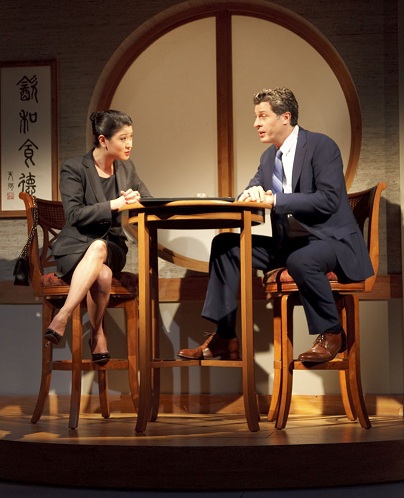
Chinglish is the word coined for those humorously bad Chinese-to-English mistranslations found on signs, in electronics manuals, etc. That sort of thing is hardly exclusive to China (there are plenty of examples from around the world here), but thanks to the first-world economic implosion, China is where the stakes are highest now. The new play by Chinese-American playwright David Henry Hwang (his first on Broadway in 13 years) is built around both this crucial transition and mistranslation. Bring your opera glasses, because being able to read supertitles has never been more important.
Our hero lead schlub, Daniel Cavanaugh (Gary Wilmes), opens the play alone, explaining to an unseen conference audience the secret of his business success in China. As his business is signs, this talk includes memorably mistranslated examples, most prominently "Fuck the certain price of goods," which makes perfect sense once it's explained that when Chinese script was modernized and simplified, the ideograms for "dry" and "to do" became the same.
The conference address is a brief framing device, revisited even more briefly at the end; 99% of the play is Cavanaugh's flashback to the start of his business in China three years earlier. That kicks off with him hiring a consultant there, Peter Timms (Stephen Pucci), who explains the importance of relationships to doing business in China and also emphasizes that he should bring his own translator to meetings. We are quickly shown why as Cavanagh meets with Minister Cai Guoliang (Larry Lei Zhang) and Vice Minister Xi Yan (Jennifer Lim) in hopes of winning the signage contract for the arts center they're planning for their out-of-the-way city, Guiyang. "We are a small, family-run firm" is rendered by Miss Qian (Angela Lin) as "his company is small and insignificant." We hear all of the Mandarin Chinese dialog, which is why the supertitles are so crucial. The clever set design always includes space onto which the supertitles are projected, rather than having them far above the stage. (The highly mechanized, smoothly and quickly operating set changes are marvelous.)
Soon, intrigue overtakes the clueless Cavanagh as the Vice Minister shows up for a follow-up meeting and orders Timms away. Neither her English nor Cavanaugh's powers of comprehension are quite up to the challenge of unmediated conversation, notwithstanding which they soon are in bed together in his hotel room. (Although Xi curses like a sailor, she apparently manages to have satisfying sex in her bra and panties, and Cavanagh's jockey shorts remain on as well.)
One can enjoy this play simply as hilarious farce. Certainly there are more than enough laughs for that -- they come so fast and thick during the first business meeting that half of them are drowned out by audience laughter. One occasionally wishes that the actors could drop in a few pauses, but a) it would make the cadence of the conversation completely artificial; b) enough of the laughs come from the chasm separating the supertitles' accurate translations and the Chinese translator's bungled efforts that the thread of the action can be followed even if you're missing a few jokes here and there. Although Wilmes is a bit stilted in his delivery, Pucci's comedic timing is good (his interplay with Zhang is perfect) and Lim is a riveting presence. As the Vice Minister's husband, Judge Xu Geming, Johnny Wu manages to get laughs via body language and vocal tone. (Wu doubles as Bing, another incompetent translator.)
However, should one feel inclined to delve beneath the surface, there are some meaningful points being made, not least that the misunderstandings come from ignorance of just how different American and Chinese cultures are. There's also a meaningful structure to the characters' relationships and parallels. Explaining this will involve some spoiler references, but I'll keep them as vague as possible.
Until recently, the U.S. was dominant in every way, and an Asian woman in a relationship with an American man was often an objectified exotic fetish. Now China dominates, and the American man is both the fetish object and the powerless figure in the relationship. Where the woman might have gotten the upper hand before through trickery, now the man is not tricked by her, but by his faulty expectations and assumptions; if Cavanagh had a more realistic grasp of the situation, he would see that because Xi is Chinese in China, nowadays anyone in her position is automatically more powerful than him, and there's nothing he can do about it. Because of this, because of a cultural misunderstanding, and also for what we eventually are told about his concealed background, his plight becomes rather poignant.
But at least Cavanagh gets what he came to China for, albeit in a roundabout way that initially makes him feel humiliated, and ultimately leaves him with only business success. The play has two other men -- one Chinese, even -- whose complete downfalls come from failing to recognize the new dynamics at all (the first Minister, still in his mind living in the days of the Cultural Revolution, when at least things were simple; at the end, he dons his old Red Army uniform, which still fits him) or recognizing them too late and not thoroughly thinking through all their consequences (Peter, the teacher trying to turn himself into a consultant a little too late in the game, and who picks the wrong horse in the race). But since Peter and the Minister go out together with a callback to their most amusing previous interaction, and since Cavanagh gets some of what he wants (partly because what he hid turns out to be considered an asset, another clever twist in a play full of them), a tragic tone is avoided, leaving Chinglish comfortably comedic in its overall impact.
The Longacre Theatre is at 220 West 48th Street in Manhattan.
